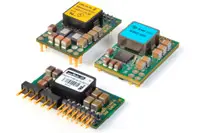Electronics News
Archive : 12 November 2014 год
 The newly formed Architects of Modern Power (AMP) consortium – established by CUI, Ericsson Power Modules and Murata Power Solutions to address and define the future of intelligent, distributed, digital power ecosystems – has announced its first set of standards.
The newly formed Architects of Modern Power (AMP) consortium – established by CUI, Ericsson Power Modules and Murata Power Solutions to address and define the future of intelligent, distributed, digital power ecosystems – has announced its first set of standards.
The four standards, revealed at electronica in Munich, cover digital point of load (POL) and advanced bus DC/DC converters.
Two have been defined for digital POL converters. The microAMP specification covers supplies rated at 20 to 25A in vertical and horizontal configurations, while the megaAMP defines requirements for 40 to 50A vertical and horizontal units.
For advanced bus DC/DC converters, the ABC-ebAMP standard relates to advanced bus bricks measuring 58.42 x 22.66mm and ranging from 264 to 300W.
For quarter brick supplies, measuring 58.42 x 36.83mm and ranging from 420 to 468W, the Group has defined the ABC-qbAMP standard. These standards detail mechanical footprints, features, and configuration files.
AMP group spokesperson and CUI vice president of advanced power, Mark Adams, commented: "Following the launch of Architects of Modern Power last month, the release of these standards marks an important first step on our shared technology roadmap."
Patrick Le Fèvre, marketing communications director at Ericsson Power Modules, added: "Providing a true multi sourced, high efficiency power ecosystem with exceptional supply chain reliability enables continuity of production for our customers.
"We are excited to make this advanced technology available in a way that allows wider adoption than would be possible with single source solutions."
Products meeting these standards are available now from the AMP group and will be on display at electronica on the CUI booth (B2-113), Murata booth (B5-107), and MEV booth (A4-260).
Author
Laura Hopperton
Source: www.newelectronics.co.uk
 Manufacturers integrating wireless modules into their products may be at risk of selling non-compliant goods, product compliance firm TÜV SÜD has warned.
Manufacturers integrating wireless modules into their products may be at risk of selling non-compliant goods, product compliance firm TÜV SÜD has warned.
The company says it is seeing a significant growth in the number of non-compliant products entering its laboratories due to the rising trend for wireless modules being added into products such as TVs, washing machines, fridges, telematics devices and factory machinery.
"Products that were not traditionally subject to the Radio and Telecommunications Terminal Equipment Directive (R&TTE) must now meet its requirements and manufacturers are failing to realise this," it said in a statement.
TÜV SÜD says a presumption is often made among manufacturers that when an R&TTE compliant module is integrated into a final host product, no further radio testing is necessary.
However, this is not the case if the module is not integrated in accordance with the module manufacturer's instructions, and it must also meet additional essential requirements of the R&TTE Directive, such as safety and EMC aspects.
Jean-Louis Evans, managing director of TÜV SÜD Product Service, explained: "The integration of wireless modules is going beyond the more traditional market, such as laptops and mobile phones, and they are now being included in everything from domestic fridges to industrial machinery. The problem is that while these wireless modules are being sold to manufacturers as being compliant, once they are integrated into another product that changes the rules.
"Manufacturers are assuming that because the wireless module is compliant, that they do not have to do any more tests to declare against different standards – this is wrong. Market surveillance authorities can come down hard on manufacturers that supply non-compliant equipment to the market and ignorance of the rules is no excuse."
Author
Laura Hopperton
Source: www.newelectronics.co.uk
